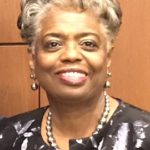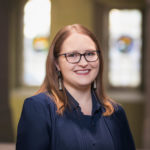The Role of Diversity, Equity, & Inclusion in a Digital Scholarship Program
 Janice S. Welburn has been dean of Marquette University Libraries since 2006. From 2003 to 2006 she served as associate dean of libraries at the University of Arizona. At the University of Iowa libraries from 1990 to 2003, Welburn served in many leadership positions, including director roles for public services, facilities, human resources, and technical services.
Janice S. Welburn has been dean of Marquette University Libraries since 2006. From 2003 to 2006 she served as associate dean of libraries at the University of Arizona. At the University of Iowa libraries from 1990 to 2003, Welburn served in many leadership positions, including director roles for public services, facilities, human resources, and technical services.
Welburn held librarian positions at New York University, the Georgia Institute of Technology, Indiana University, Princeton University, Indianapolis–Marian County Public Library and Bishop College in Dallas.
Her academic and professional engagement currently includes serving as an American Library Association endowment trustee and as member of the ALA Council and the ALA International Relations Committee. In 2011, Welburn’s peers selected her as the ACRL Academic/Research Librarian of the Year, a national award recognizing her contributions to librarianship.
Welburn’s teaching contributions include several years leading courses in fund development and conflict management with the Association of Research Libraries online lyceum. An active community leader, Welburn serves on the Friends of the Haggerty Museum board and University of Wisconsin–Milwaukee School of Information Studies advisory board. Welburn is current president of the Milwaukee chapter of Links, Incorporated, a national service organization for professional women of color working to strengthen African-American communities.
Slides
Does DEI Need Another ‘D’ and ‘I’? Situating Decolonization and Indigenization Work in Academic Libraries
 Sarah Dupont is of Métis-settler heritage and uses she/her pronouns. Formerly the inaugural Aboriginal Engagement Librarian at The University of British Columbia (UBC), Sarah became the Head Librarian of the X̱wi7x̱wa Library in 2019. In this role, she provides leadership on complex collections, programming, and community engagement work from this small-in-size-but-mighty-in-mandate branch, which is the only Indigenous branch library at a post-secondary institution in Canada. She proudly oversees the dynamic work of the incredible Xwi7xwa team of four full time employees and a number of student librarians.
Sarah Dupont is of Métis-settler heritage and uses she/her pronouns. Formerly the inaugural Aboriginal Engagement Librarian at The University of British Columbia (UBC), Sarah became the Head Librarian of the X̱wi7x̱wa Library in 2019. In this role, she provides leadership on complex collections, programming, and community engagement work from this small-in-size-but-mighty-in-mandate branch, which is the only Indigenous branch library at a post-secondary institution in Canada. She proudly oversees the dynamic work of the incredible Xwi7xwa team of four full time employees and a number of student librarians.
As a Head Librarian, Sarah works on Indigenous initiatives in the Library, campus-wide, and beyond the university. A community capacity building program that Sarah helped develop and is now Chairing the Steering Committee for is called Indigitization, which focuses on the digitization and preservation of community cultural heritage. Recruitment and support for Indigenous graduate students in their journeys to becoming information professionals is another priority for Sarah: she previously served as the UBC iSchool’s First Nations Curriculum Concentration Coordinator and adjunct instructor. She is currently the Council of Prairie and Pacific University Libraries’ (COPPUL) Chair of the Indigenous Knowledge Standing Committee and is proud to have recently been awarded its Outstanding Contribution Award.
Video
Vimeo: https://vimeo.com/464088731
YouTube: https://youtu.be/Oi9XJmazRaA
Campus Discussion Questions
These questions are intended for use by committees, task forces, and planning groups that are considering a digital scholarship program, re-thinking an existing digital scholarship program, or augmenting an existing program. Individuals in the group can watch the recording of a webinar and then discuss these questions as a group. A set of questions will be available for each webinar.
- Do your institution’s goals or strategic plan include statements about diversity, equity, and inclusion (DEI)? Can those statements form the basis of a conversation among the planning group and/or library staff about how to incorporate DEI into digital scholarship programs?
- Can you build on students’ interest in current social movements to work with them on digital projects? Can you also encourage faculty to partner with you on integrating assignments that collect and/or use digital resources on social movements (local or national) into their courses?
- Do you have criteria that include diversity, equity, and inclusion aspects that are used to evaluate which digital scholarship projects the library will partner with and support?
- Are your staff and digital scholarship spaces welcoming to a diverse student body? Do your spaces make a wide variety of your students feel welcome?